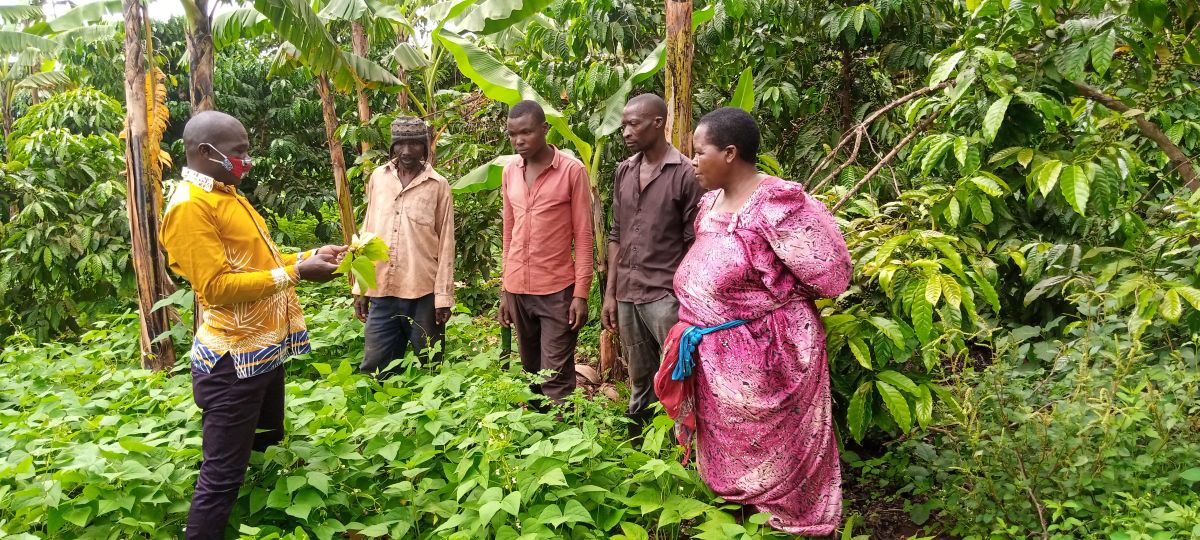CultiAF precooked beans project is working to improve nutrition and address gender inequality in Kenya and Uganda.
Beans enrich Ugandan households
On the slope of a small hill in Kambugu village in Kiboga, Uganda, Jennifer Nakaye’s green, leafy bean farm stretches over 1.2 ha. Nakaye, 61, keeps her thick, red beans in 90 kg sacks in a wooden store opposite the main house; however, these are not ordinary beans, they are enriched with iron and zinc.
Nakaye and the other farmers in her village have been growing this NAROBEAN 1 variety for three years since it was introduced by a precooked-beans project under the Cultivate Africa’s Future Fund (CultiAF), a ten-year, CAD35-million partnership between IDRC and the Australian Centre for International Agricultural Research (ACIAR). The beans project, led by Uganda’s National Agricultural Research Organisation (NARO), the Kenya Agricultural and Livestock Research Organization and the Pan-Africa Bean Research Alliance (PABRA), aims to improve nutrition and address gender inequality in the bean value chain and local communities in Kenya and Uganda.
“Before the project was introduced here in 2017, we were mainly growing beans for food, but through training with NARO and CEDO [Community Enterprise Development Organisation], we realized that this type of bean is a most profitable crop. You can plant the beans and harvest them twice in a year before you sell any maize,” Nakaye explained. “These beans have changed my life. Before, I could not earn 10,000 Ugandan shillings [approximately CAD3.6] from my crops, but with these beans, I can earn 1 million shillings [approximately CAD357] each planting season – or even more! I usually plant 0.6-0.8 ha,” said Kaweesa George William, a farmer from Kiboga district. The beans are sold to local processors, who turn them into a quick-cooking bean product, a ready-to-eat bean snack bar, bean flour, bean noodles and bean chunks (an ingredient used to make bread). These provide smallholder farmers with a reliable income.
Banking on beans
Nakaye harvests over 4,000 kg of beans a year, from which she earns around 8 million Uganda shillings – over CAD2,800. The proceeds from the beans have enabled Nakaye to educate her children to college and university level. She has been able to buy a commercial plot in Kakiri town near Kampala, Uganda’s capital, on which she plans to set up rental shops.
Access to her income has been made easier thanks to a mobile app called the MasterCard Farmer Network (MFN). The app, which was set up in November 2018, in partnership with MasterCard, NARO and PABRA, was developed to help women farmers in particular to access their own income directly, as opposed to it going through their husbands first. Women are encouraged to open mobile money accounts or bank accounts in their own names and, through the app, they receive the payment for their grain delivery.
Jonah Arinaitwe, a female bean farmer in Isingiro district, Uganda, has been an MFN platform member since March 2021. Not only can she access her bean income directly, but the app also benefits her in her role as an agent for the local farming cooperative, Manyakabi Area Cooperative Enterprises (MACE). As part of this role, Arinaitwe has mobilized over 150 farmers – including 120 women – to grow the NAROBEAN 1 variety, which she collects from the farmers and sells to MACE in bulk. When MACE integrated MFN into its operations, Arinaitwe was one of the agents selected to use the digital platform. “MFN has eased my work and most of it is now done using my smart phone instead of filling out papers. Now I can register farmers and report expected harvests using MFN without having to travel to the MACE office in the hills of Isingiro District,” she said.
From the income Arinaitwe makes from her bean farming and agency work, she has been able to branch out into different enterprises. “I have been able to start up a piggery production business; I now have five sows and one male and over 20 piglets, which I have been selling at the markets.”
The challenges of COVID-19
But while the improved beans have provided an alternative and profitable source of income for some farmers, many have struggled with production in the last two seasons due to challenges triggered by COVID-19. Lockdown measures saw many farmers unable to access farm inputs, and those with sick relatives were isolated. Others had to spend most of their income on taking care of their family’s health. In addition to these unexpected health costs, the price of beans fell. According to Isaac Mugagga, a precooked-beans project leader, this was due to over production and rollover stock from previous years. “Adapting contracts to be based on volume rather than prices seems to work better than fixing prices in advance. The contracting buyer offers market price plus a small margin to keep producers loyal,” said Mugagga, highlighting a potential way forward for farmers.
And the farmers remain positive about their future in beans: “We have been mobilizing other farmers to start growing the beans by showing them where they can access quality seeds and demonstrating how we have benefited from the earning we get. We said we cannot abandon growing beans,” said Kaweesa, who plans to increase the size of his bean farm from 0.8 to 2 ha. When the challenges around COVID-19 have lessened, Nakaye also wants to put more effort into growing beans. “Together with other farmers, when the COVID situation improves, we want to construct better storage facilities and increase our production efforts,” she said.
This blog was first published on the IDRC website.

